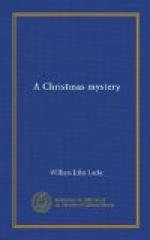The three men looked at one another. Suddenly McCurdie shivered and drew his fur coat around him.
“I’ll thank you,” said he, “to shut that window.”
“It is shut,” said Doyne.
“It’s just uncanny,” said McCurdie, looking from one to the other.
“What?” asked Doyne.
“Nothing, if you didn’t feel it.”
“There did seem to be a sudden draught,” said Professor Biggleswade. “But as both window and door are shut, it could only be imaginary.”
“It wasn’t imaginary,” muttered McCurdie.
Then he laughed harshly. “My father and mother came from Cromarty,” he said with apparent irrelevance.
“That’s the Highlands,” said the Professor.
“Ay,” said McCurdie.
Lord Doyne said nothing, but tugged at his moustache and looked out of the window as the frozen meadows and bits of river and willows raced past. A dead silence fell on them. McCurdie broke it with another laugh and took a whiskey flask from his hand-bag.
“Have a nip?”
“Thanks, no,” said the Professor. “I have to keep to a strict dietary, and I only drink hot milk and water—and of that sparingly. I have some in a thermos bottle.”
Lord Doyne also declining the whiskey, McCurdie swallowed a dram and declared himself to be better. The Professor took from his bag a foreign review in which a German sciolist had dared to question his interpretation of a Hittite inscription. Over the man’s ineptitude he fell asleep and snored loudly.
To escape from his immediate neighbourhood McCurdie went to the other end of the seat and faced Lord Doyne, who had resumed his gold glasses and his listless contemplation of obscure actresses. McCurdie lit a pipe, Doyne another black cigar. The train thundered on.
Presently they all lunched together in the restaurant car. The windows steamed, but here and there through a wiped patch of pane a white world was revealed. The snow was falling. As they passed through Westbury, McCurdie looked mechanically for the famous white horse carved into the chalk of the down; but it was not visible beneath the thick covering of snow.
“It’ll be just like this all the way to Gehenna—Trehenna, I mean,” said McCurdie.
Doyne nodded. He had done his life’s work amid all extreme fiercenesses of heat and cold, in burning droughts, in simoons and in icy wildernesses, and a ray or two more of the pale sun or a flake or two more of the gentle snow of England mattered to him but little. But Biggleswade rubbed the pane with his table-napkin and gazed apprehensively at the prospect.
“If only this wretched train would stop,” said he, “I would go back again.”
And he thought how comfortable it would be to sneak home again to his books and thus elude not only the Deverills, but the Christmas jollities of his sisters’ families, who would think him miles away. But the train was timed not to stop till Plymouth, two hundred and thirty-five miles from London, and thither was he being relentlessly carried. Then he quarrelled with his food, which brought a certain consolation.




